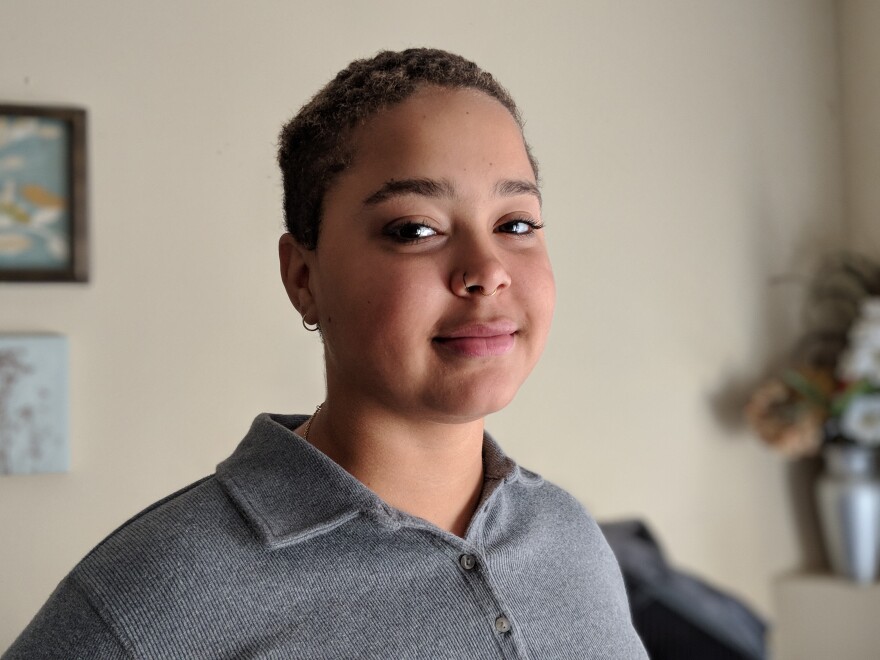This August, students at four elementary schools in rural Stanly County will return from summer vacation to fresh pencils, notebooks, and signs announcing the presence of armed officers on campus.
The Stanly County school board made the decision soon after the shooting at Marjory Stoneman Douglas High School in Parkland, Florida. Members wanted to take advantage of a 2013 state law allowing retired law enforcement to volunteer as school resource officers.
“The best of all worlds is of course to have school resource officers, in our opinion, in every school,” said Stanly County Superintendent Jeff James. “It’s unfortunate that our society has come to that, but that’s where we find ourselves these days.”
The additional officers are meant to protect students. But Jayla Hagans, a student organizer, doesn’t see it this way.
“If I had a child that was in elementary school, I wouldn’t feel comfortable with a retired police officer there with a gun to try and protect my children,” said Hagans, a senior at Leesville High School in Raleigh. “It just doesn’t seem very logical to me, so it’s hard for me to even try and fathom what people are thinking, and what can be at the root of that.”
The Criminalization Of Student Behavior
For some parents, school resource officers provide a sense of security. Lisa Kaylie, who has two children in the Chapel Hill-Carrboro school system, says they are important to protect schools against external violence.
But resource officers also represent a big shift in the way students are disciplined, and that shift has disproportionately impacted students of color, other parents and advocates say.
“Back in the day, when two students would get in a fight, they would not be put in handcuffs, they wouldn’t have charges,” said Hagans, who is black. “The teachers there, the administration would separate them and take them to principal’s office and they would talk through it.”
I find that to be very problematic, and a problem that we have to address nationally, which is the trend to criminalize fairly common disciplinary events. -University of Florida law professor Jason Nance
Hagans said, now that there are resource officers, “if something like that happens, they’re immediately -- especially if they’re black and brown -- they’re tackled and harassed. It’s completely unnecessary. They’re put in handcuffs. Most likely they get charges and are suspended.”
There is plenty of data to back up Hagans’ concerns. In a 2015 analysis of federal school discipline data, University of Florida law professor Jason Nance found that schools with resource officers are twice as likely to refer students to law enforcement for minor offenses like fighting without a weapon.
“I find that to be very problematic, and a problem that we have to address nationally, which is the trend to criminalize fairly common disciplinary events, and involving law enforcement in those types of incidents,” Nance said.
Stanly County is just one of a few North Carolina counties looking to have more law enforcement patrol school hallways. The Johnston County school system recently applied for a $1.4 million grant to fund an additional 12 school resource officers. And school officials in Rockingham County have expressed interested in starting a volunteer school resource officer program.
A Disproportionate Impact On Students of Color
Peggy Nicholson encountered similar criminalization of common disciplinary incidents in her last position, as an attorney for Legal Aid of North Carolina. She’s now co-director of the Youth Justice Project in Durham, which aims to increase fairness in education and juvenile and criminal justice systems.
“I had an eight-year-old client who was referred to juvenile court for shaking his pencil at a teacher,” Nicholson said. “And it was charged as communicating threats, and of course the judge threw it out. But this eight-year-old who was already behind academically had to miss multiple days of school to go to court, to get an attorney, and to get it eventually dismissed by the judge.”
Nicholson’s client was a student of color, like a large percentage of students referred to law enforcement by schools. In North Carolina, black students make up about a quarter of enrollment, but more than half of school-based juvenile delinquency complaints, according to data from the state’s Department of Juvenile Justice.
“As a black woman, with black children, I totally reject this idea or this notion that somehow black kids are worse,” said Letha Muhammad, director of the Education Justice Alliance. “That is a lie. That is an absolute lie.”
It's the ways in which black students are patrolled, are disciplined – that's where the problem is. -Letha Muhammad
Muhammad’s organization advocates for equity in school discipline in Wake County, and across the state of North Carolina.
“It’s the ways in which black students are patrolled, are disciplined -- that’s where the problem is,” she said.
Muhammad said she, too, wants her kids to be safe at school. But she doesn’t believe school resource officers are the answer to her concerns.
“What about if we put supports in place to help young people who are struggling, who have issues?” she said. “What if there was some kind of safety net there to really recognize that something’s going on with a young person, and get them the critical help they need, so that they can be helped as opposed to coming into the school to harm others?”
Stanly County Superintendent Jeff James agrees. His district has more than 8,000 students, and two school psychologists, according to data from the North Carolina Department of Public Instruction. But James said licensed counselors are double the cost of school resource officers.
“Is putting resource officers in school [the answer], no,” he said.” It’s just hopefully a deterrent from some maniac, that if they would’ve gotten proper medical and mental health treatment, then that would be the best of both worlds. Then we wouldn’t have them shooting up the place to start with.”









